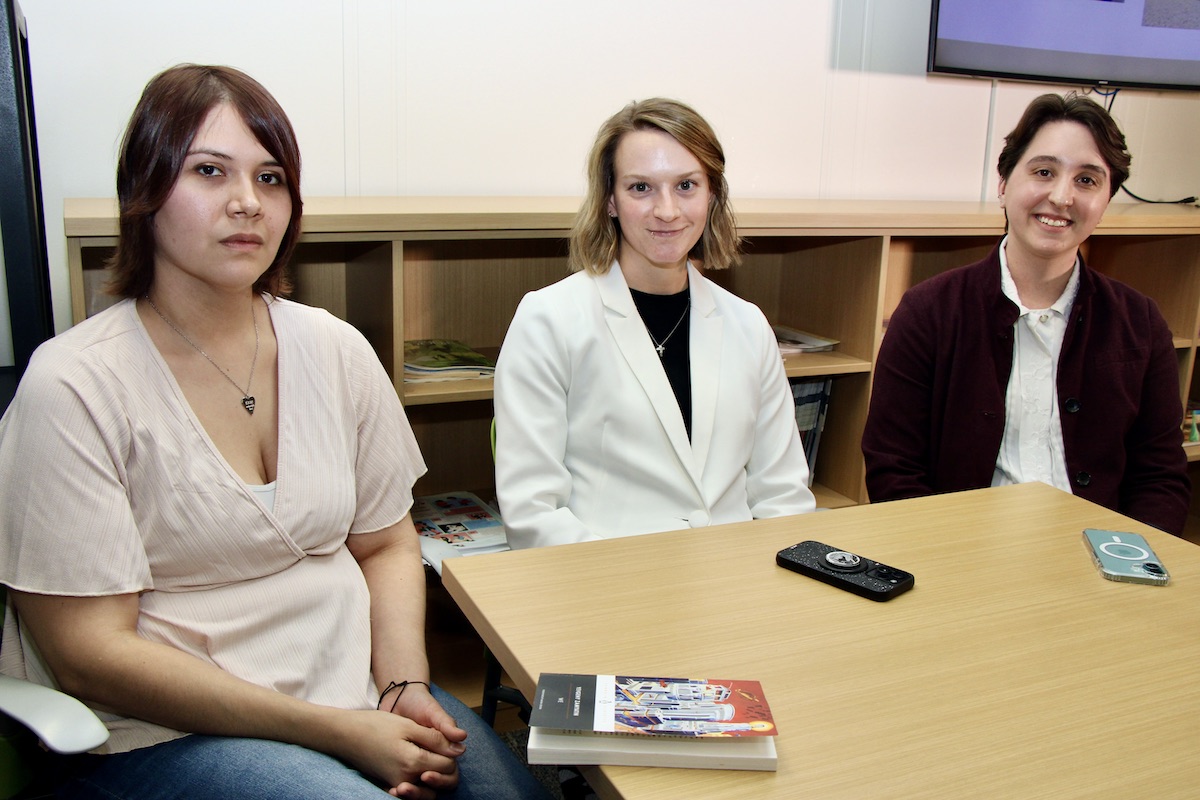Purdue Psychological Sciences PhD candidates prepare for accolades, networking at Psychonomic Society conference in NYC

Purdue University psychological sciences candidate Alyssa Randez, right, talks about her research with another attendee at the 2023 Psychonomic Society’s annual meeting in San Francisco.(Photo provided)
Written by: Tim Brouk, tbrouk@purdue.edu
Since 2019, Purdue University Department of Psychological Sciences graduate students have earned six major awards at the renowned Psychonomic Society’s annual meeting. The international organization is the largest for cognitive study in psychology with more than 4,300 scientists as members.
The Purdue accolades — namely the J. Frank Yates Student Travel Award — from the Psychonomic Society in the last five years are double the next BIG 10 schools’ graduate student award totals — Northwestern University and University of Illinois each have three awards in the last half-decade from the Psychonomic Society.
“It’s really great they are getting the attention, notoriety and awards they are getting, in addition to the publicity,” said Tom Redick, professor of psychological sciences. “Having a (research) poster is a big deal at this particular conference. … There are larger conferences that exist but for this particular type of work, this is definitely the major one.”
The 2024 event is marked for Nov. 21-24 in New York City. The conference is expected to draw about 2,700 psychology students, researchers and professionals. More than 1,600 research presentations will be made.
The Purdue students will gain experience presenting their work in front of the top cognitive psychology researchers in the nation while networking for their next career steps after Purdue.
“For those who do cognitive research, it’s the largest society. They’re the publishers of some of the major journals for folks in the field,” Redick said. “Some of our faculty have been editors at various points as well.
“Having our successful students getting these awards is super helpful for recruiting graduate students.”
Three of the recent awardees are still studying at Purdue — PhD candidates Andy Fordyce, Alyssa Randez and Alexa Bushinski. Fordyce and Bushinski will be in New York with new research to present.

Randez, left, and her fellow Purdue Psychological Sciences PhD students Alexa Bushinski, middle, and Andy Fordyce have won major awards from the Psychonomic Society, one of the largest international organizations in the field of cognitive psychology. (Tim Brouk)
Fordyce’s work is a continuation of their research in retrieval practice effect, a popular study target in the cognitive psychology of education. Their findings bolster the practice of testing on information for better memory than passive study strategies like just rereading the information. Fordyce’s research also explores the time and location students study as well as various retrieval cues for ultimate recall.
Bushinksi will present new research on spatial memory — the ability to store and recall information about the environment and one’s position within it — and navigation. How do people use verbal and visual working memory to navigate a new, novel environment? The young researcher gave study participants a spatial navigation task to complete and then recorded the amount of verbal and/or spatial information each participants needed to complete the task .
“There’s a lot of individual differences,” Bushinski explained. “Some people get lost a lot. Some people just know how to find their way in new places. There are different reasons why they might get lost.”
The findings suggested visuospatial working memory was much more predictive of how people can navigate new environments and people with higher visuospatial working memory are better navigators.
Randez will not attend the upcoming conference, but she said her award-winning experience in 2023 in San Francisco was unforgettable. Her research focuses on the cognitive effort within motivation.
“I’m looking at how task design can differently influence people beyond just ability or difficulty,” Rendez said. “How do people look for information to complete the task?”
In the shadows of Times Square, the Boilermaker brain behavioralists’ New York minutes will be an unforgettable professional experience thanks to their research excellence.
“We’re really proud that the students on all of the dimensions are representing our department and the university this way,” Redick said.
Discover more from News | College of Health and Human Sciences
Subscribe to get the latest posts sent to your email.